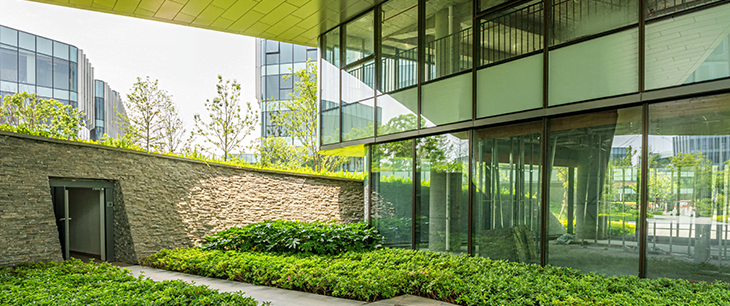Sustainability risk is one the biggest risks that the construction industry faces, but it is also one of the biggest opportunities for market leadership and future-proofing profitability. Sustainable construction refers to construction activities where negative impacts are minimized, and positive impacts are maximized in order to achieve a balance of environmental, economic, and social performance.
The balancing of the three Ps (people, planet and profits) is the dominant concept in adopting a sustainability strategy. This is especially true as Marsh forecasts global construction output to grow 42% by 2030. The construction industry generates an estimated 39% of the world's carbon emissions, according to the World Green Building Council (WGBC).
The WGBC notes that operational emissions (from energy used to heat, cool, and light buildings) account for 28% while 11% comes from embodied carbon emissions or upfront carbon that is associated with materials and construction processes throughout the whole building lifecycle. Beyond emissions, the environmental impact of construction and buildings is undeniable. The Canada Green Building Council finds that buildings generate 35% of landfill waste while consuming up to 70% of municipal water.
Recognizing the challenges
The construction industry is unique and complex as it must consider increasingly stringent regulations on health and safety as well as sustainability while trying to control costs and maintain efficient processes with multiple suppliers and subcontractors. The industry is also creating leading practices to design and develop structures that are scalable, taller, greener, healthier, and more technologically advanced. At the same time, it's dealing with pressures to reduce energy costs and carbon emissions while using energy-intensive heavy equipment.
Some of the challenges facing the industry include:

Managing the risks
The industry recognizes the need to address these urgent and often competing issues, especially within their supply chains. The construction industry is well placed to meet these challenges by pursuing sustainability goals and measuring progress through environmental, social, and governance (ESG) reporting.
In fact, the industry has long been a leader in the sustainability and environmental leadership space with associations such as Leadership in Energy and Environmental Design (LEED), one of the most relevant building certification programs worldwide. LEED certification has seen tremendous growth with more than 96,000 LEED projects in 167 countries. According to Statista, there were only 296 certifications in the U.S. in 2006. This demonstrates that organizations can meet changing consumer, employee, and investor expectations.
Some key sustainability enabling activities include:
- Adopting sustainable construction strategies by planning and incorporating sustainability throughout the life of a construction project from start to finish.
- Implementing control mechanisms to ensure materials are ethically sourced and verifying that labour standards and fair humanitarian practices are in place with all subcontractors and suppliers.
- Implementing sustainable design, engineering, and construction practices powered by transparent and relevant data to measure, monitor, and reduce emissions and waste throughout the project lifecycle.
- Planning and deploying strategic optimization for logistics processes that optimize deliveries to reduce mileage, emissions, and the carbon footprint.
- Prioritizing energy efficiency in assets and equipment that is safe for both the environment and workforce.
With mounting pressure from consumers, regulators, and investors on organizations' environmental and societal impact, ESG has become a business imperative. Executive teams have incentives to implement processes and initiatives to demonstrate ESG performance metrics and how they are safeguarding their business success over the long term.
Today, business has a new playing field as companies and boards must now think about their stakeholders, not just shareholders. For the construction industry, the opportunities to carve out market share as a sustainable, socially conscious business are significant. Those that achieve brand recognition in this space will be well positioned to capitalize on the wave of demand in the future.
Contacts
Pierre Taillefer
Partner, National ESG Leader, BDO Canada
Chantal Cousineau
Partner, Quebec Practice Leader Real Estate and Construction, BDO Canada
Y Nguyen
Head of Sustainability Risk Advisory, BDO Canada